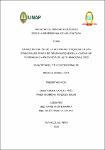Caracterización de la actividad pesquera en las principales zonas de desembarque de la ciudad de Yurimaguas – Provincia de Alto Amazonas 2020

Date
2022Author
Vargas Peña, Maricarmen
Mendoza Salas, Raisa Andreina
Metadata
Show full item recordAbstract
The present research work was carried out between the months of November
2020 to March 2021, with the objective of characterizing the fishing activity of
the main landing areas of the city of Yurimaguas - province of Alto Amazonas;
The study focused on the registration of fishing landing information, obtained
through the application of evaluation instruments to artisanal fishermen, the
evaluation points for fishermen were the main fish sales areas such as the "La
Loretana" berth, " San Miguel”, “La Boca”, “La Ramada” and the “Abel Guerra”
dock. The results of the investigation show that the fishing zone of the Nucuray
river represents 23.04% of the landing volume of the city of Yurimaguas,
followed by the Marañón with 17.55% and the Pastaza river with 4.90%;
Likewise, the fishing gear most used by artisanal fishermen are the sling net,
which represents 35.66%, followed by the trawl net, which represents 33.24%
of the total catch; The CPUE in the Nucuray River is represented by 1,552
kg/trip, followed by the Marañón River with 1,256 kg/trip, while the lowest value
corresponds to the Dos de Mayo fishing zone with a contribution of 752 kg/trip
; in relation to the most representative species, these are Prochilodus nigricans
(24.17%) and Megaleporinus trifasciatus (20.21%), followed by Calophysus
macropterus (8.92%); In addition, the Characiformes order represents the taxa
with the highest frequency in the captures, with 72.35%, followed by the
Siluriformes order with 18.46%; in relation to the capture sizes, within the
framework of the regulated species, the maiden is captured below the
minimum size allowed and the boquichico presented values above the
minimum capture size. A total fishing landing of 242,520 Kg was obtained with
51 vessels operating. The fishing activity is carried out through the use of
wooden boats of 7-10 meters in length with an average load capacity of 1,230
kg. El presente trabajo de investigación, se ejecutó entre los meses de noviembre
2020 a marzo del 2021, teniendo como objetivo la caracterización de la
actividad pesquera de las principales zonas de desembarque de la
ciudad de Yurimaguas - provincia de Alto Amazonas; el estudio se enfocó
en el registro de información de desembarque pesquero, obtenida mediante
la aplicación de instrumentos de evaluación a los pescadores artesanales, los
puntos de evaluación a los pescadores fueron las principales zonas de
expendio de pescado como el atracadero “La Loretana”, “San Miguel”, “La
Boca”, “La Ramada” y el atracadero “Abel Guerra”. Los resultados de la
investigación muestras que la zona de pesca del río Nucuray representa el
23.04% del volumen de desembarque de la ciudad de Yurimaguas, seguido
del Marañón con 17.55% y del rio Pastaza con 4.90%; asimismo, las artes de
pesca más utilizadas por los pescadores artesanales son la red hondera que
representa el 35.66%, seguido de la red de arrastre que representa el 33.24%
de la captura total; la CPUE en el río Nucuray está representado por 1 552
kg/viaje, seguido del río Marañón con 1 256 kg/viaje, mientras que la de menor
valor corresponde a la zona de pesca de Dos de Mayo con un aporte de 752
kg/viaje; en relación a las especies más representativas, esta son Prochilodus
nigricans (24.17%) y Megaleporinus trifasciatus (20.21%), seguido de
Calophysus macropterus (8.92%); además, el orden Characiformes
representa el taxa de mayor frecuencia en las capturas, con 72.35%, seguido
del orden Siluriformes con 18.46%; en relación a las tallas de captura, en el
marco de las especies reglamentadas, la doncella se captura por debajo de la
talla mínima permitida y el boquichico presentó valores por encima de la talla
mínima de captura. Se obtuvo un desembarque pesquero total de 242,520 Kg
con 51 embarcaciones operando. La actividad pesquera se realiza mediante
el uso de botes de madera de 7-10 metros de longitud con una capacidad de
carga promedio de 1,230 kg.
Collections
- Tesis [145]

